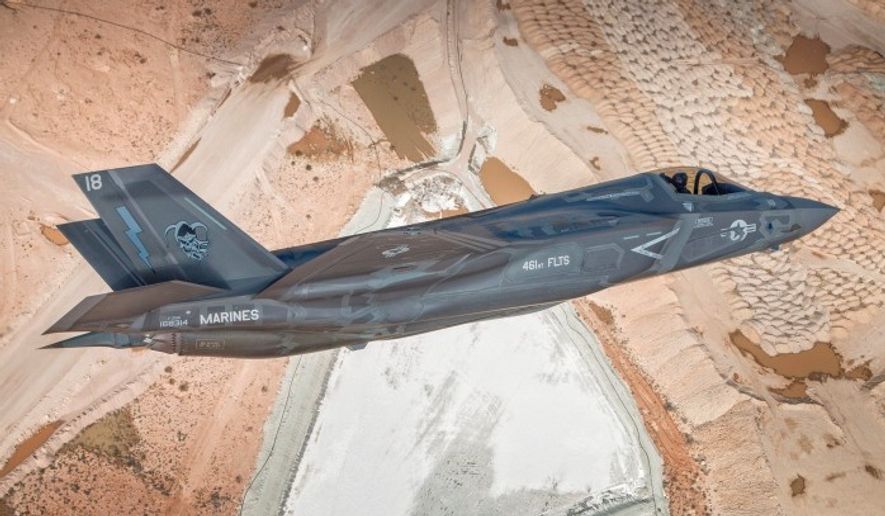House lawmakers defended the F-35 Joint Strike Fighter program on Wednesday, rejecting a proposal to cut the number of aircraft despite concerns it’s not meeting standards and is moving too quickly.
Rep. Jackie Speier, California Democrat, proposed an amendment to cut six F-35s as part of debate on the annual defense authorization bill in the House Armed Services Committee. Ms. Speier pointed to recent reports from the Government Accountability Office and the Defense Department inspector general that raised concerns about the F-35 engines as well as the schedule of producing planes.
The report from the Defense Department inspector general released Monday on the quality of the F-35 engines as well as the department’s oversight of the program found 61 “nonconformities” and recommended that the Pentagon establish new quality goals and monitor the program more closely.
A GAO report released earlier this month also found that “the F-35 engine reliability is not improving as expected and will take additional time and resources to achieve reliability goals.” The report also said ramping up production while problems with the aircraft are still being tested and fixed could result in increased costs or scheduling delays.
“Despite these warning signs, I was troubled to see in chairman’s mark that we added an additional six aircraft on top of 57 aircraft already in budget request,” Ms. Speier said.
Her amendment, which failed on a voice vote, would have cut six aircraft from the Air Force, bringing the total planes authorized in 2016 to 57 — the number requested by the president — instead of the 63 included in the committee chairman’s draft bill.
SEE ALSO: John McCain, John Kasich call for change in CIA drone program after hostage-killing attack
The cuts would have saved more than $588 million, which Ms. Speier would have added to the National Guard and Reserve Equipment Account.
Rep. Jeff Miller, the Florida Republican whose district is home to the base where pilots are being trained to fly the F-35, touted the program’s accomplishments, including meeting its goal of delivering 36 aircraft in 2014.
Rep. Michael Turner, Ohio Republican, also objected to the amendment and criticized Ms. Speier for not attending hearings where lawmakers heard from officials the number included in the draft defense bill met national security requirements. Mr. Turner also said that the program is poised to achieve savings as the number of planes produced ramps up.
“Perhaps the member, if they had attended, would know the issues that she’s raising could have been dealt with in our hearings instead of in an amendment,” he said.
Recent reports are not the first problems that have plagued the procurement of the F-35 Joint Strike Fighter. The project overall is more than seven years behind schedule and millions of dollars over budget. While the F-35s were initially projected to be about $81 million per plane, the Project on Government Oversight estimates the delays and repeated problems will make the true cost of each plane about $219 million or more.
The reason behind the problems is that, instead of testing various aspects of the plane before it started production, Lockheed Martin began producing and testing the plane at the same time, POGO said.
SEE ALSO: Purple Heart for Oklahoma City bombing victims
Despite problems like a costly redesign, bulkhead cracks, too much weight, and delays to essential software — and even debate about if the new stealth fighter is actually needed — Bloomberg dubbed it “too big to kill” because of the 133,000 jobs it creates in lawmakers’ districts around the country.
Wednesday’s mark up is one of the first steps in the annual process of passing a bill to lay out the Defense Department’s priorities for the next year. The version that passes out of the committee will still need to pass the whole House and be reconciled with whatever the Senate approves for a final bill.
• Jacqueline Klimas can be reached at jklimas@washingtontimes.com.




Please read our comment policy before commenting.